|
|
|
Sort Order |
|
|
|
Items / Page
|
|
|
|
|
|
|
| Srl | Item |
| 1 |
ID:
024742
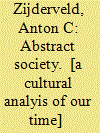

|
|
|
|
|
| Publication |
London, Allen Lane the Penguin press, 1970.
|
| Description |
xi, 180p.
|
| Standard Number |
0713902736
|
|
|
|
|
|
|
|
|
|
|
|
Copies: C:1/I:0,R:0,Q:0
Circulation
| Accession# | Call# | Current Location | Status | Policy | Location |
| 009613 | 301/ZIJ 009613 | Main | On Shelf | General | |
|
|
|
|
| 2 |
ID:
098783
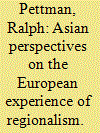

|
|
|
|
|
| Publication |
2010.
|
| Summary/Abstract |
How have European state-makers managed to coordinate various key activities to the point where many of them see the European Union as providing a model for the rest of the world in general and Asia in particular? For example, most of Europe now shares a common market and a common currency. This was originally considered unthinkable. However, most European state-makers did surrender significant aspects of their sovereign power to make this happen. State-makers in the Asian region have not yet followed suit. This tells us something about their competing politico-strategic, economic and social concerns. Asian state-makers are nonetheless capable of sustaining their own form of regionalism. This tells us something about the different politico-cultural context in which they live. This context makes it possible to promote distinctly 'Asian' perspectives. It provides an Asian alternative to European regionalism and a way of compensating for the limits and distortions of the European Union.
|
|
|
|
|
|
|
|
|
|
|
|
|
|
|
|
| 3 |
ID:
089393
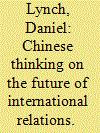

|
|
|
|
|
| Publication |
2009.
|
| Summary/Abstract |
China's evidently unstoppable "rise" energizes PRC political and intellectual elites to think seriously about the future of international relations. How will (and should) China's international roles change in the forthcoming decades? How should its leaders put the country's rapidly-increasing power to use? Foreign China specialists have tended to use an overly-streamlined "resisting" the West versus "co-operating" with it (or even simpler "optimistic" versus "pessimistic") scale to address such questions, partly reflecting the divide between Realism and Neoliberalism in American international relations theory. By 2002, a near-consensus had developed (though never shared universally) that China had become an increasingly co-operative power since the mid-1990s and would continue to pursue the policy prescriptions of Neoliberal international relations theory. But using more nuanced "English school" analytical techniques - and examining the writings of Chinese elites themselves, aimed solely at Chinese audiences - this article discovers an unmistakably cynical Realism to be still at the core of Chinese thinking on the international future. Even elites who appear sincere in their promotion of co-operation firmly reject "solidarism" among the world's leading states and insist upon upholding the difference between China and all others. Many demand - and foresee - China using its future power to pursue world objectives that would depart in significant respects from those of the other leading states and non-state actors.
|
|
|
|
|
|
|
|
|
|
|
|
|
|
|
|
| 4 |
ID:
099198


|
|
|
| 5 |
ID:
101907
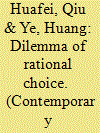

|
|
|
| 6 |
ID:
185161
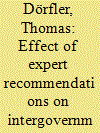

|
|
|
|
|
| Summary/Abstract |
The article explores whether and to what extent expert recommendations affect decision-making within the Security Council and its North Korea and Iran sanctions regimes. The article first develops a rationalist theoretical argument to show why making many second-stage decisions, such as determining lists of items under export restrictions, subjects Security Council members to repeating coordination situations. Expert recommendations may provide focal point solutions to coordination problems, even when interests diverge and preferences remain stable. Empirically, the article first explores whether expert recommendations affected decision-making on commodity sanctions imposed on North Korea. Council members heavily relied on recommended export trigger lists as focal points, solving a divisive conflict among great powers. Second, the article explores whether expert recommendations affected the designation of sanctions violators in the Iran sanctions regime. Council members designated individuals and entities following expert recommendations as focal points, despite conflicting interests among great powers. The article concludes that expert recommendations are an additional means of influence in Security Council decision-making and seem relevant for second-stage decision-making among great powers in other international organisations.
|
|
|
|
|
|
|
|
|
|
|
|
|
|
|
|
| 7 |
ID:
083580
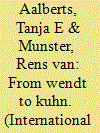

|
|
|
|
|
| Publication |
2008.
|
| Summary/Abstract |
Constructivism is often identified as the legitimate occupant of the middle ground between rationalism and reflectivism that emerged from the Third Debate in international relations (IR) theory. Indeed, the rationalist-constructivist debate is already being framed as the next dominant debate with the IR community. This paper evaluates the bridge-building project as initiated by Alexander Wendt, and takes issue with the via media as proposed by the so-called conventional constructivists. It is claimed that the rationalist-constructivist debate has been limited to a discussion of ontology, which has brought about a contradiction between ontology and epistemology. Returning to the pressing epistemological issues that were put on the table by reflectivist scholars, this article refocuses the current debate by taking up the Kuhnian link between substance and science. It elaborates a view of science as a communal practice built on intersubjective conventions and argumentative procedures. This leads to an alternative conception of the middle ground as a communicative space.
|
|
|
|
|
|
|
|
|
|
|
|
|
|
|
|
| 8 |
ID:
044754
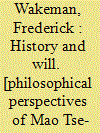

|
|
|
|
|
| Publication |
Berkeley, University of California Press, 1973.
|
| Description |
xvi, 392p.hbk
|
| Series |
Center for Chinese Studies
|
| Standard Number |
0520021045
|
|
|
|
|
|
|
|
|
|
|
|
Copies: C:1/I:0,R:0,Q:0
Circulation
| Accession# | Call# | Current Location | Status | Policy | Location |
| 011940 | 951.05/WAK 011940 | Main | On Shelf | General | |
|
|
|
|
| 9 |
ID:
143902
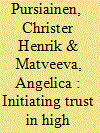

|
|
|
|
|
| Summary/Abstract |
Trust is central to international politics. Trust-related theoretical arguments can be divided between rationalist, cultural and psychological schools. We present concise reviews of these approaches, emphasizing the initial trust-creation phase, and apply these factors to our historical case: the emergence of a fragile interpersonal trust between Mikhail Gorbachev and Ronald Reagan before and during their first meeting in Geneva in 1985. Based on archives and first-hand reminiscences, we conclude that the cultural trust theories are not able to contribute much to the initial trust-building process in this particular case, except for explaining the obstacles for trust. The rational approaches explain the necessary but not sufficient conditions for trust to emerge. Ultimately, what triggered the trust that ultimately ended the Cold War cannot be understood without taking into account the cognitive and psychological factors involved in this interpersonal relationship.
|
|
|
|
|
|
|
|
|
|
|
|
|
|
|
|
| 10 |
ID:
144045
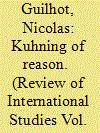

|
|
|
|
|
| Summary/Abstract |
Beyond the initial infatuation with his work, Kuhn’s Structure of Scientific Revolutions has had a lasting impact on the field of International Relations. The article analyses the reception of Kuhn in IR and suggests that it contributed to overcoming the ‘second debate’ by making science and realism fully compatible. More importantly, Kuhn offered a vision of science in which scientific communities operated on the basis of realist principles. This not only consolidated the academic hold of neorealism, but transformed realism into a theory of knowledge, which its critics have failed to acknowledge. This lasting transformation is analysed by looking at Kuhn’s influence on the classic studies of strategic decision-making by Graham Allison and Robert Jervis.
|
|
|
|
|
|
|
|
|
|
|
|
|
|
|
|
| 11 |
ID:
163255
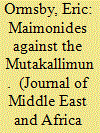

|
|
|
|
|
| Summary/Abstract |
In his Guide of the Perplexed, Maimonides criticizes certain unnamed Muslim theologians, especially with regard to their views on possibility. Maimonides identifies these views as stemming from the theologians’ espousal of the notion of “intellectual admissibility.” By this, they seem to mean that whatever is conceivable is possible in actuality. Maimonides strongly rejects this notion, as it appears to undermine any rational order in the world. This article explores this notion, and attempts to define what disturbed Maimonides so powerfully about its implications. At the same time, it becomes clear that Maimonides shares certain views of the theologians, even if for quite different reasons.
|
|
|
|
|
|
|
|
|
|
|
|
|
|
|
|
| 12 |
ID:
149496
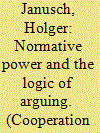

|
|
|
|
|
| Summary/Abstract |
The concept of Europe as a normative power can be understood as a theoretical attempt to define a new type of protagonist in world politics, distinct from older concepts such as empire, hegemonic power, or great power. Because many scholars have used universal norms as a criterion for ‘normative power Europe’, the concept is often criticized as hidden Eurocentrism, soft imperialism, or hegemony. In this article, a normative power is defined not by the universality of the norms it seeks to diffuse, but by the underlying logic according to which it acts. A normative power takes communicative actions and acts in accordance with the logic of arguing, not consequentialism. This definition of normative power escapes the trap of a hidden Eurocentric imperialism by abstracting the theoretical concept from the specific case of Europe and detaching it from the criterion of universal norms.
|
|
|
|
|
|
|
|
|
|
|
|
|
|
|
|
| 13 |
ID:
059293
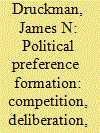

|
|
|
| 14 |
ID:
118164
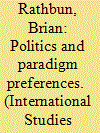

|
|
|
|
|
| Publication |
2012.
|
| Summary/Abstract |
Are international relations scholars objective observers of political events, or do our political preferences influence the way in which we see the world? This article explores that question using data from a survey of international relations scholars. It develops and tests hypotheses about how we might expect adherents of particular paradigms to identify themselves politically on a left-right scale based on the resonance between the content of ideology and the key propositions of different schools of thought in IR. Although they are relatively centrist, I find that realists are the most conservative and right-leaning of international relations scholars, while Liberals are more liberal and left-leaning. Although neither approach has any intrinsic ontological content, rationalism and constructivism also have a distinct ideological profile, the former being more conservative than the latter. Post-positivist epistemological commitments are associated with the political left. More importantly, there is an interaction between ontology and epistemology. Positivism plays a role in breaking the link between political values and paradigm choice. Nonpositivists demonstrate the strongest connection between ideology and international relations approach. I consider the implications of these findings for the use of paradigms in international relations theorizing, arguing that they should make us more circumspect about the use of paradigms in our discipline.
|
|
|
|
|
|
|
|
|
|
|
|
|
|
|
|
| 15 |
ID:
133240
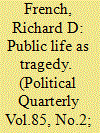

|
|
|
|
|
| Publication |
2014.
|
| Summary/Abstract |
Some of the most perceptive observers of public life have emphasised its tragic dimensions, not so much out of sympathy for politicians, but because the lens of tragedy offers a unique insight into the realities of the world of politics. Here I attempt to synthesise this tragic perspective by employing the comments of those best positioned to identify the salient features of public life, its primary dramatis personae. Politics occasionally provides us with the kind of spectacular catastrophe that journalists like to construe as tragedy. But our purpose is to evoke a different, more personal, less visible kind of tragedy: the small but malignant tragedies of self-betrayal, of inflation of the ego and deflation of conscience, of helpless witness to injustice and misfortune, of status unaccompanied by power or efficacy, of the shrinking of aspiration to the scale of the practicable, of disillusion and, on occasion, of despair.
|
|
|
|
|
|
|
|
|
|
|
|
|
|
|
|
| 16 |
ID:
143144
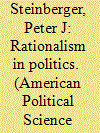

|
|
|
|
|
| Summary/Abstract |
Much recent political thought has been devoted to the proposition that neither political endeavor properly understood nor theorizing about such endeavor is or could ever be a kind of rational activity. I examine three broad approaches that celebrate, respectively, rhetorical practices of political persuasion, agonistic conceptions of democracy, and, more generally, a kind of hard-headed critical realism rooted in the plain facts of political life. I argue that criticisms of rationalism in politics associated with these approaches systematically ignore central tenets of what might be called a post-Kantian convergence of recent and important philosophical perspectives and that such perspectives can be enormously useful in addressing and critically evaluating the underlying intellectual structures of political life.
|
|
|
|
|
|
|
|
|
|
|
|
|
|
|
|
| 17 |
ID:
024741
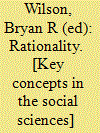

|
|
|
|
|
| Publication |
Oxford, Basil Blackwell, 1970.
|
| Description |
vii, 275p.
|
| Standard Number |
0631119302
|
|
|
|
|
|
|
|
|
|
|
|
Copies: C:1/I:0,R:0,Q:0
Circulation
| Accession# | Call# | Current Location | Status | Policy | Location |
| 008413 | 301/WIL 008413 | Main | On Shelf | General | |
|
|
|
|
| 18 |
ID:
091022
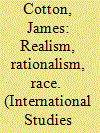

|
|
|
|
|
| Publication |
2009.
|
| Summary/Abstract |
The received view of the development of the international relations discipline in Australia discounts its early history, maintaining that it only came into existence in the 1960s. It was then confined, according to this account, within a realist-rationalist discourse. This article shows that if realism-rationalism is the identifying feature of the discipline in Australia, then many exemplars can be found in the earlier period from the 1920s to the Pacific War. Problems regarding empire, obligations towards the League of Nations, and Australia's position in the Pacific region were major concerns. Arguments in support of the League, or for an emerging Pacific order, were often couched in rationalist terms; with the increasing international uncertainty of the 1930s, realist arguments became more prominent. There are also some examples of revolutionist theory. However, a major preoccupation across the spectrum of international thinkers was the issue of race and the exclusionary White Australia immigration policy. It is argued that this theme cannot be readily assimilated to realism-rationalism.
|
|
|
|
|
|
|
|
|
|
|
|
|
|
|
|
| 19 |
ID:
095475
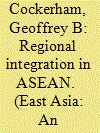

|
|
|
|
|
| Publication |
2010.
|
| Summary/Abstract |
This paper investigates regional integration in the Association of Southeast Asian Nations (ASEAN) by analyzing the agreements developed within the ASEAN framework since its founding in 1967. This examination reveals that, although integration in ASEAN is certainly influenced by norms and values, the integration process can be best understood by intergovernmentalism. While many agreements have been developed within the ASEAN framework and have become more legalistic in nature, they tend to mostly be in functional areas and exhibit low levels of transparency and delegation. The design of ASEAN is indicative of an overriding concern for state sovereignty as a key strategic interest for member states.
|
|
|
|
|
|
|
|
|
|
|
|
|
|
|
|
| 20 |
ID:
177036
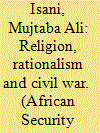

|
|
|
|
|
| Summary/Abstract |
What role does religion play in understanding the outbreak of civil war? The purpose of this study is to offer an alternative understanding which conceptualises religion as discourse, religious identity as sacred narrative, and religious nationalism as a conflict over the power to shape interpretations of political legitimacy. A rationalist explanation for the role of religion in the outbreak of the Algerian civil war provides an empirical motivation for the argument. By conceptualising religion largely in rational-material terms, I contend that rationalists fail to appreciate religion’s unique attraction – the belief that the ultimate seat of political authority exists beyond the state and in some transcendent reality. As an alternative, I conceptualise religion as a discursive institution, explaining how the contest to shape a faith’s sacred narrative can result in physical violence. This exercise is a first step in a broader research agenda addressing how a robust theory of religious identity can enhance scholars’ understanding of peace and conflict.
|
|
|
|
|
|
|
|
|
|
|
|
|
|
|
|
|
|
|
|
|